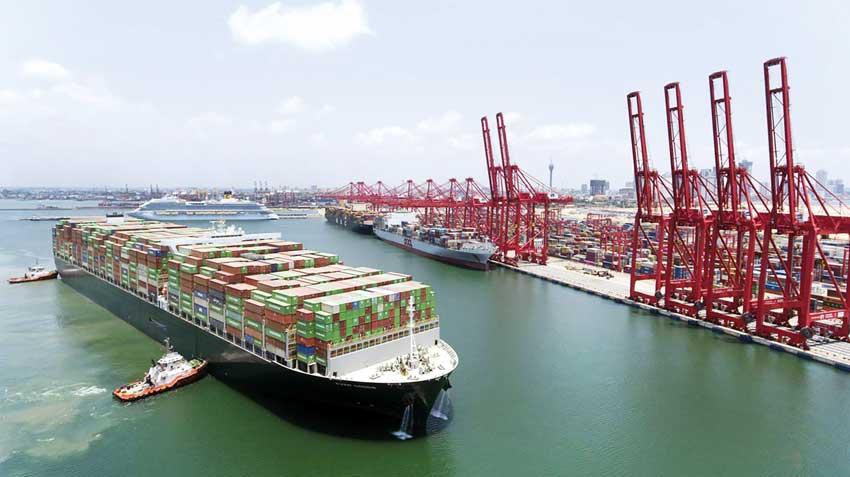09 Nov 2020 - {{hitsCtrl.values.hits}}

 This concept termed ‘new international economic order’ is not a new one – it’s a 50-year-old concept to promote the interests of developing countries vis-à-vis developed countries in early 70s. This is relevant now because the international economic order, like an organism, continues to evolve especially in the context of the current pandemic situation.
This concept termed ‘new international economic order’ is not a new one – it’s a 50-year-old concept to promote the interests of developing countries vis-à-vis developed countries in early 70s. This is relevant now because the international economic order, like an organism, continues to evolve especially in the context of the current pandemic situation.
Many countries suffered the external shocks of COVID-19 without social protection, public health systems, a plan to reach sustainable real economy, with quality jobs, etc.
How will COVID-19 affect the developing countries, especially Sri Lanka’s economic growth prospects? The answer will depend on how globalisation, meaning increased trade and investments between the countries, evolves in the pandemic’s aftermath.
The World health organisation, International Monetary Fund (IMF) and other expert organisations claimed that there are large unknowns about how long it will take to develop and deploy effective vaccines, the duration and likelihood of repeat outbreaks and lockdowns and the eventual economic ramifications.
According to Arvind Subramanian, Chief Economic Adviser to the Government of India, Ministry of Finance of India, there is every reason to worry that a historic process of deglobalisation is underway, threatening to scuttle the growth models of poor countries that previously used trade and investment as a path to economic development.
The IMF, which has called the current situation “a crisis like no other”, also slashed its growth forecast for the world economy, expecting the global GDP growth in 2020 to be minus at -4.4 percent.
How deglobalisation is hurting world’s emerging economies
Even before the pandemic, the global merchandise export-to-GDP ratio had been declining for the first time since World War II, falling by about 5 percentage points since 2008 to about 20 percent last year. As per the IMF data above, it asserted that this is not the first time that the world has deglobalised. Between World War I and the eve of World War II, world trade collapsed and the export-to-GDP ratio fell from a peak of 16 percent in 1913 to just over 6 percent.
Today’s deglobalisation was brought on by other factors. As we all know, new protectionist barriers have been erected, due to trade restrictions imposed by US President Donald Trump’s administration since 2017, targeted mainly at China. At global level, they have been partly offset by the ongoing new free-trade agreements, such as the Economic Partnership Agreement that the European Union and Japan concluded in 2018.
The question now is how the pandemic will influence the process of deglobalisation that was already underway. One possible scenario is the deglobalisation accelerates as countries and firms reassess the benefits of trade against the risks of import dependence. Alternatively, deglobalisation could be driven by China’s economic transition. In that case, a few developing countries would benefit at least for the medium term.
Best of both world-economic convergence through sustainable development
Since the early 1990s, the world had been witnessing an economic ‘convergence’, whereby poor countries finally were beginning to catch up with rich ones. Although some countries, especially in East Asia, had already been converging for a long time, only in the past three decades did this become a truly global phenomenon.
In the post-pandemic climate, we should expect a continued acceleration of deglobalisation. The growth ladder used by Singapore, Taiwan, Hong Kong, South Korea, China and Vietnam will be kicked away from still-lagging countries in South Asia, Latin America and Africa. The middle-income countries that were growing at about 4 percent per capita annually before the global financial crisis have been averaging one percent growth thereafter.
The developing countries like Sri Lanka would have to look for new growth models that will evolve to have more trickle-down effect to the bottom of the pyramid and innovative poverty reduction strategy programmes aimed at looking after the livelihood of poor people.
The world under COVID-19 would be more inclusive and must follow a sustainable development agenda. Today, we live in a world in which inequality between and within countries has grown as a result of businesses’ race to the bottom and working poverty among a vast portion of the workforce.
As economic difficulties mount, the inevitable growth of nationalism and “my nation first” politics will push companies to localise business operations that favour national and regional supply chains, ‘Eurasia’ founder Ian Bremmer asserted. His view is while China has successfully transformed itself into an economic and technological superpower, no one expected it to become a ‘soft power’ superpower. This crisis can change that, if China’s crisis diplomacy continues and the perception that Beijing has been far more effective than the rest of the world in its response to the outbreak.
The IMF claims that it is possible to identify some points for an international prosperity. One of the positive features is the fact that technology is being used widely to tackle the pandemic. Video conferencing, remote desktops and new social platforms are powering remote work almost overnight, a trend that may continue once lockdowns are lifted.
Digitalisation of services—from telehealth to online education to cashless transfers and emergency assistance to support the vulnerable—has been at the centre of country responses.
Way forward
Under the present circumstances, Sri Lanka cannot use neo-liberal development policies. Neo-liberal economics is an updated version of the liberal economics of Adam Smith. The core of neo-liberal agenda includes ‘laissez faire’, with no or little government intervention, deregulation, privatisation, opening up of international trade and investment, certain forms of monopoly.
When we looked at the success stories of the developed countries, these countries when they were initially developing, they followed ‘interventionist’ policies.
As we know, the necessary prerequisite for economic development is the political stability. Strong political leadership, having a powerful ‘executive presidential system’, could establish this stability. This allows the correct economic policies to be implemented in a disciplined manner for an extended period of time without disruption.
Once political stability is established, a bottom up, three-pronged approach like what the successful Asian countries adopted must be used for rapid economic growth.
In the three-pronged approach, first there must be a clear policy intervention to uplift the agriculture sector and regional-based industrialisation. This policy should address land use plan reforms, agricultural best practices, focus on the entire value chain for the produce, so as to increase the productivity and incomes of the agriculture sector workers, which constitute around quarter of the working population.
With increased incomes and savings, these workers should be encouraged to invest in producing basic industrial goods to supplement their incomes. The primary goal of the government here is to increase the purchasing power of the predominantly rural agricultural workers.
As for much-needed capital, according to the Central Bank, commercial banks have already granted approval of bank loans to SMEs totalling Rs.130 billion, at 4 percent interest under COVID relief assistance scheme, during the period from April ending October 20.
In addition to capital formation, human resources become the most important asset along with underutilised and cultivable, arable agricultural land that could be put into use by deploying unemployed youth.
Recent surveys have revealed that the total cultivated extents of major crops – tea and rubber under plantation companies (RPCs) have drastically reduced by end-2018, when compared with 1995 figures just after the privatisation of plantations: (i) tea, cultivated extent 1995 - 88,227 hectares: 2018 - 69,201 hectares (ii) rubber, cultivated - 1995- 58,453 hectares 2018 - 35,508 hectares.
According to Sharan Burrow, the General Secretary of the International Trade Union Confederation, our goal for recovery should be to ensure creating more job opportunities and a new social contract. Public investment in the care economy, education and low-carbon infrastructure can form the backbone of stimulus that reduces inequality.
Wage policy, collective bargaining and labour market regulation can revive demand and income while putting an end to a business model that allows companies to take no responsibility for their workers.
RPCs and other companies engaged in agro-based industries need to migrate into new business model focusing more on sustainable agricultural practices and other development programmes of estates through infusion of increased investments/management inputs.
Second, use the surplus labour in the rural areas to create simple industries that produce light consumer and basic industrial goods. The government should intervene to provide the know-how, help with importing the machinery and create markets domestically. There should be active government intervention in financial policy, finding export markets and making sure domestic companies will be competitive in international markets.
The more promising ventures that have export potential should be subsidised but assistance should only be based on the export success and/or import substitution.
Third level: once the above stages are successful, the workers know-how and skill levels will improve to take on third, the next level of industrial production. The talented youth, especially ICT-savvy guys nurtured and supported by the government under the knowledge-based economy could find more foreign markets for their ‘BPO back office work’, such as accounting, financial restructuring and the expected the foreign exchange income would be US $ 3 billion (compared to tea of US $ 1.3 billion only) per year.
Furthermore, substantial markets will be created for consumer goods, machine tools, infrastructure and energy because of the increasing purchasing power, due to increase in worker’s incomes.
In conclusion, if we are to truly fast-track development initiatives to improve the economic welfare of the people of this country, we need to start from zero-based primary business development having an inclusive sustainable growth strategy. This is the way forward.
24 Dec 2024 55 minute ago
24 Dec 2024 1 hours ago
24 Dec 2024 2 hours ago
24 Dec 2024 4 hours ago
24 Dec 2024 4 hours ago